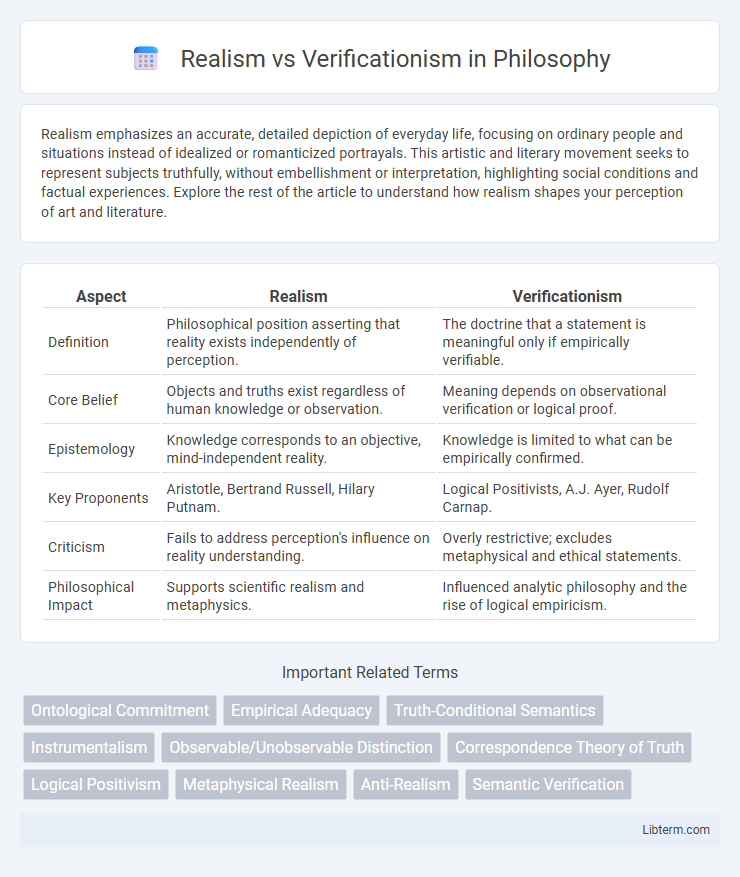Realism emphasizes an accurate, detailed depiction of everyday life, focusing on ordinary people and situations instead of idealized or romanticized portrayals. This artistic and literary movement seeks to represent subjects truthfully, without embellishment or interpretation, highlighting social conditions and factual experiences. Explore the rest of the article to understand how realism shapes your perception of art and literature.
Table of Comparison
| Aspect | Realism | Verificationism |
|---|---|---|
| Definition | Philosophical position asserting that reality exists independently of perception. | The doctrine that a statement is meaningful only if empirically verifiable. |
| Core Belief | Objects and truths exist regardless of human knowledge or observation. | Meaning depends on observational verification or logical proof. |
| Epistemology | Knowledge corresponds to an objective, mind-independent reality. | Knowledge is limited to what can be empirically confirmed. |
| Key Proponents | Aristotle, Bertrand Russell, Hilary Putnam. | Logical Positivists, A.J. Ayer, Rudolf Carnap. |
| Criticism | Fails to address perception's influence on reality understanding. | Overly restrictive; excludes metaphysical and ethical statements. |
| Philosophical Impact | Supports scientific realism and metaphysics. | Influenced analytic philosophy and the rise of logical empiricism. |
Understanding Realism: Core Principles
Realism asserts that an objective reality exists independently of human perception, emphasizing that truths and entities are discoverable through observation and reason. Core principles include the belief in mind-independent objects, the existence of universal laws governing natural phenomena, and the commitment to truth as correspondence between statements and real-world states. This framework contrasts with verificationism by prioritizing the reality of unobservable entities and the possibility of metaphysical truths beyond empirical verification.
Defining Verificationism: An Overview
Verificationism posits that a statement's meaning is strictly tied to its method of empirical verification or falsification, emphasizing observable evidence as the criterion for meaningfulness. This philosophical approach contrasts with Realism by rejecting metaphysical claims that cannot be empirically tested, asserting that only propositions verifiable through sensory experience hold cognitive significance. Verificationism significantly influences logical positivism and analytic philosophy, shaping debates on language, knowledge, and scientific inquiry.
Historical Origins of Realism and Verificationism
Realism originated in ancient Greek philosophy, notably through Aristotle's emphasis on an objective reality existing independently of perception. Verificationism emerged in the early 20th century as a principle within the Logical Positivist movement, primarily led by the Vienna Circle, which argued that a statement's meaning is grounded in its method of empirical verification. Both philosophies shaped epistemological debates by contrasting the belief in an independently existing world with the idea that meaningful statements must be empirically testable.
Major Philosophers Shaping Both Doctrines
Realism is notably shaped by philosophers like Aristotle and Hilary Putnam, who emphasize the existence of an objective reality independent of perception. Verificationism, championed by A.J. Ayer and the logical positivists, asserts that the meaning of statements is rooted in their empirical verifiability. The debate between these schools rests on the ontological status of entities and the criteria for meaningful discourse, fundamentally influencing epistemology and the philosophy of science.
Key Differences Between Realism and Verificationism
Realism asserts that an external reality exists independently of human perception, emphasizing objective truth regardless of observation. Verificationism, rooted in logical positivism, holds that a statement is meaningful only if it can be empirically verified or is analytically true. The key difference lies in realism's acceptance of metaphysical entities versus verificationism's demand for empirical or logical verification to ascribe meaning.
Epistemological Implications of Both Theories
Realism asserts that knowledge corresponds to an objective reality independent of human perception, emphasizing that truths exist whether or not they can be empirically verified. Verificationism, rooted in logical positivism, insists that meaningful knowledge must be empirically confirmable through sensory experience, thereby rejecting metaphysical claims as cognitively meaningless. The epistemological tension between realism and verificationism centers on the scope and limits of knowledge validation, influencing debates on scientific theories' truth claims and the demarcation of meaningful statements.
Criticisms and Challenges Facing Realism
Realism faces criticism for its reliance on the assumption that theoretical entities exist independently of human perception, which verificationism challenges by emphasizing empirical verification as the sole criterion for meaningful statements. Critics argue realism struggles with the problem of underdetermination, where multiple, empirically equivalent theories can explain the same phenomena, undermining claims to objective truth. Verificationism contends that realism's metaphysical commitments are unverifiable and thus scientifically irrelevant, posing significant challenges to its epistemological justification.
Critiques and Limitations of Verificationism
Verificationism, rooted in the logical positivist tradition, faces significant critiques for its narrow criterion of meaningfulness, which excludes metaphysical, ethical, and aesthetic statements as cognitively meaningless. Critics argue that its reliance on empirical verification is self-defeating since the verification principle itself cannot be empirically verified. Furthermore, verificationism struggles with scientific theories that are not directly observable or falsifiable, limiting its applicability and undermining its foundational claim that meaningful propositions must be empirically testable.
Contemporary Debates: Realism vs Verificationism
Contemporary debates between Realism and Verificationism center on the nature of truth and scientific knowledge, where Realism asserts that scientific theories describe an objective reality independent of human perception. Verificationism, rooted in logical positivism, claims that statements are meaningful only if empirically verifiable, challenging the realist notion of unobservable entities. Critics argue that Verificationism's strict empirical criteria exclude theoretical terms crucial for scientific progress, while Realism faces challenges in justifying claims about unobservable phenomena.
Impact on Science and Philosophy Today
Realism supports the existence of an objective reality independent of observation, shaping scientific inquiry by encouraging theories that reflect true aspects of the world. Verificationism demands that scientific statements be empirically verifiable, influencing the philosophy of science by emphasizing testability and practical evidence. The ongoing debate impacts scientific methodology and epistemology, driving discussions on theory confirmation, falsifiability, and the nature of truth in modern science and philosophy.
Realism Infographic

 libterm.com
libterm.com